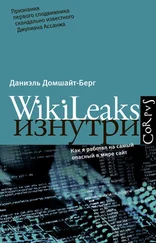Harding, Luke - WikiLeaks - Inside Julian Assange's War on Secrecy
Здесь есть возможность читать онлайн «Harding, Luke - WikiLeaks - Inside Julian Assange's War on Secrecy» весь текст электронной книги совершенно бесплатно (целиком полную версию без сокращений). В некоторых случаях можно слушать аудио, скачать через торрент в формате fb2 и присутствует краткое содержание. Жанр: Старинная литература, на английском языке. Описание произведения, (предисловие) а так же отзывы посетителей доступны на портале библиотеки ЛибКат.
- Название:WikiLeaks: Inside Julian Assange's War on Secrecy
- Автор:
- Жанр:
- Год:неизвестен
- ISBN:нет данных
- Рейтинг книги:3 / 5. Голосов: 1
-
Избранное:Добавить в избранное
- Отзывы:
-
Ваша оценка:
- 60
- 1
- 2
- 3
- 4
- 5
WikiLeaks: Inside Julian Assange's War on Secrecy: краткое содержание, описание и аннотация
Предлагаем к чтению аннотацию, описание, краткое содержание или предисловие (зависит от того, что написал сам автор книги «WikiLeaks: Inside Julian Assange's War on Secrecy»). Если вы не нашли необходимую информацию о книге — напишите в комментариях, мы постараемся отыскать её.
WikiLeaks: Inside Julian Assange's War on Secrecy — читать онлайн бесплатно полную книгу (весь текст) целиком
Ниже представлен текст книги, разбитый по страницам. Система сохранения места последней прочитанной страницы, позволяет с удобством читать онлайн бесплатно книгу «WikiLeaks: Inside Julian Assange's War on Secrecy», без необходимости каждый раз заново искать на чём Вы остановились. Поставьте закладку, и сможете в любой момент перейти на страницу, на которой закончили чтение.
Интервал:
Закладка:
Fifteen miles inland, at the unremarkable village of Ellingham, they finally turned left. The car skidded on a driveway, and drove past an ancient dovecote before stopping in front of a grand Georgian manor house. The woman stepped from the car. There was something odd about her. She had a kind of hump! If a CIA agent or some other observer were hidden in the woodland along with the pheasants, they could have been forgiven for a moment of puzzlement.
Close up, however, it was obvious that this strange figure was Julian Assange, his platinum hair concealed by a wig. At more than 6ft tall, he was never going to be a very convincing female. “You can’t imagine how ridiculous it was,” WikiLeaks’ James Ball later said. “He’d stayed dressed up as an old woman for more than two hours.” Assange was swapping genders in a pantomime attempt to evade possible pursuers. With him were also his young aide, Sarah Harrison, and his deputy, the Icelandic journalist Kristinn Hrafnsson. On that evening, this small team was the nucleus of WikiLeaks, the whistleblower website Assange had launched four years earlier.
In a breathtakingly short time, WikiLeaks had soared out of its previous niche as an obscure radical website to become a widely known online news platform. Assange had published leaked footage showing airborne US helicopter pilots executing two Reuters employees in Baghdad, seemingly as if they were playing a video-game. He had followed up this coup with another, even bigger sensation: an unprecedented newspaper deal, brokered with the Guardian newspaper in London, to reveal hundreds of thousands of classified US military field reports from the wars in Afghanistan and Iraq, many of them damning.
Assange, a 39-year-old Australian, was a computer hacker of genius. He could be charming, capable of deadpan humour and wit. But he could also be waspish, flaring into anger and recrimination. Assange’s mercurial temperament spawned groupies and enemies, supporters and ill-wishers, sometimes even in the same person. Information messiah or cyber-terrorist? Freedom fighter or sociopath? Moral crusader or deluded narcissist? The debate over Assange would reverberate in the coming weeks in headlines the world over.
Assange and his team had fled here from the Frontline Club, a hang-out for foreign correspondents and other media types in west London. Since July and the launch of the Afghan war logs, Assange had slept, on and off, in the club’s accommodation at Southwick Mews. The club’s founder, Vaughan Smith, had become a sympathiser and ally, and invited Assange and his coterie to his ancestral home, Ellingham Hall, tucked away in a remote corner of East Anglia. And here these unlikely refugees had now arrived.
Smith was a former captain of the Grenadier Guards, an elite regiment of the British army, who went on to become a freelance video journalist with Frontline TV. His adventures in war zones – Iraq during the first Gulf war, where he bluffed his way in disguised as a British army officer; Bosnia, with its massacres and horrors; Afghanistan; and Iraq again – had demonstrated a spirit of maverick independence. Smith was no anarchist. His family had served in the British army for generations. His paper of choice was Britain’s conservative, crusty Daily Telegraph . Smith was also brave. In Kosovo, his life was saved when a deadly bullet lodged in his mobile telephone.
But in common with other right-wing libertarians, he had a stubborn sense of fair play and believed in sticking up for the underdog. In this instance that meant Assange, who had become a hate figure for the bellicose US right. They wanted him arrested. Some were even calling for his assassination. Smith broadly supported Assange’s crusade for transparency at a time when – as Smith saw it – journalism itself had moved uncomfortably close to government, and was in danger of becoming mere PR fluff.
When Assange settled in to work at Ellingham Hall, already living in the manor house were Pranvera Shema, Smith’s Kosovo-born wife, and their two small children. Aged five and two, their bikes stood outside the hall’s imposing porte-cochère entrance. Also in residence on the estate were Vaughan’s upper-class parents. Vaughan’s father, too, had served in the Guards; a portrait of him as a young officer in a scarlet tunic hung in the dining room. Smith Sr could be seen holding a white pouch: a discreet reference to his career as a Queen’s Messenger. The role involved travelling around the world on Her Majesty’s business, hand-carrying diplomatic secrets. It was clear that Smith Sr took a dim view of Assange, who was believed to be in possession of an astonishingly large number of secret diplomatic dispatches.
Smith Sr would take to patrolling the estate – with its twin lakes and cedar trees – armed with a rifle. The rifle was fitted with a sniper-sight. The sniper-sight was camouflaged. Normally he fired at partridge and grouse. The temptation, however, to take a shot at the paparazzi that would soon encamp themselves outside the manor – or indeed at the unwashed radicals inside it – must have been considerable. Asked two days before Christmas whether he was enjoying playing host to the group of international leakers who were here, he answered through gritted teeth. “I wish they weren’t.” It was one of many ironies that would pepper the tension-filled weeks.
Among the WikiLeakers at Ellingham was 24-year-old James Ball, whom Assange had recruited, one of the few collaborators to receive a salary. Ball’s talent was for dealing with large data sets. A cool young man, he was experiencing a giddy rise. Within a matter of months he went from a job as reporter on the Grocer trade magazine to being a spokesman for WikiLeaks, and even debating with the US diplomat John Negroponte on BBC World’s Hardtalk programme. Ball’s first task was urgent: to go into Norwich, 15 miles away, and head for a branch of the John Lewis department store for technical equipment. He set off, carrying several thousand pounds in cash (Assange’s preferred medium of exchange), emerging with several laptops, a router, and cabling – and leaving a bemused shop assistant in his wake. “Have you ever tried spending £ 1,000 cash in John Lewis? Honestly, the assistant looked scared of £50 notes,” Ball reflected. “It was a surreal experience.”
The team began setting up an anonymous internet identity. Their connection was designed to give the electronic impression that the WikiLeaks team sitting in rustic England was actually based in Sweden. The preoccupation with security was paramount: WikiLeaks was believed to be a permanent target for US surveillance and potentially crippling cyber-attacks. On trips outside the manor house, the team used the same counter-surveillance techniques they had employed during the journey to Norfolk. This may have been prudent. But it meant Ball was sometimes left hanging round for several hours at minor B-roads and other freezing rendezvous points, waiting for a lift.
Ensconced in a grand living room with a log fire, decorated with more portraits of Vaughan Smith’s forebears, Assange got to work. Typically, he would spend between 16 and 18 hours a day in front of his laptop, sometimes staying up for a 48-hour period before crashing out on the floor. Other WikiLeaks staff would rouse him, and prod him towards the upstairs bedrooms. He would sleep for a couple of hours. Then he would carry on. Assange’s cycle was nocturnal. He was at his most accessible at 3am or 4am. “I found it easier to do stuff at night when you could sometimes get Julian’s attention. He’s entirely capable of ignoring someone for five minutes while they’re calling at him, ‘Julian! Julian!’,” says Ball. Other WikiLeaks associates – Sarah Harrison and Joseph Farrell, both recent journalistic interns – managed his email and diary.
Читать дальшеИнтервал:
Закладка:
Похожие книги на «WikiLeaks: Inside Julian Assange's War on Secrecy»
Представляем Вашему вниманию похожие книги на «WikiLeaks: Inside Julian Assange's War on Secrecy» списком для выбора. Мы отобрали схожую по названию и смыслу литературу в надежде предоставить читателям больше вариантов отыскать новые, интересные, ещё непрочитанные произведения.
Обсуждение, отзывы о книге «WikiLeaks: Inside Julian Assange's War on Secrecy» и просто собственные мнения читателей. Оставьте ваши комментарии, напишите, что Вы думаете о произведении, его смысле или главных героях. Укажите что конкретно понравилось, а что нет, и почему Вы так считаете.












